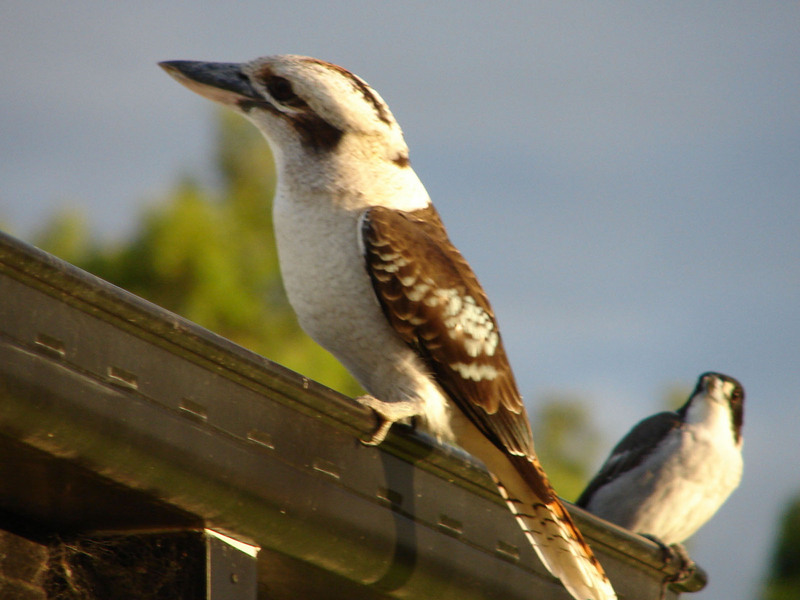ERROR : Server Busy(-1105)
ERROR : Server Busy(-1105)
Kookaburra (Genus: Dacelo) - Wiki
Kookaburra
From Wikipedia, the free encyclopedia
[Photo] Kookuburra posing for a Butcher Bird. Taken on 27/03/2007. Photo by Mister macphisto http://en.wikipedia.org/wiki/User:Mister_macphisto
Kookaburras are very large terrestrial kingfishers native to Australia and New Guinea, the name a loanword from Wiradjuri guuguubarra, which is onomatopoeic of its call.
Kookaburras are best known for their unmistakable call, which is uncannily like loud, echoing human laughter ??? good-natured, if rather hysterical, merriment in the case of the well-known Laughing Kookaburra (Dacelo novaeguineae); and maniacal cackling in the case of the slightly smaller Blue-winged Kookaburra (Dacelo leachii).
Classification and species
There are four known species of Kookaburra found in Australia, New Guinea and the Aru Islands.
- Dacelo gaudichaud - Rufous-bellied Kookaburra
- Dacelo leachii - Blue-winged Kookaburra
- Dacelo novaeguineae - Laughing Kookaburra
- Dacelo tyro - Spangled Kookaburra
Unusually for close relatives, the Laughing and Blue-winged species are direct competitors in the area where their ranges overlap. This suggests that the two species, though having common stock, evolved in isolation (possibly during a period when Australia and New Guinea were more distant ??? see Australia-New Guinea) and were only brought back into contact in relatively recent geological times.
Behaviour
Diet
Kookaburras are carnivorous. They will eat lizards, snakes, insects, mice and raw meat. The more social birds will accept handouts from humans and will take raw or cooked meat (even if at high temperature) from on or near open-air barbecues left unattended. It is generally not advised to feed the birds too regularly as meat alone does not include calcium and other nutrients essential to the bird. Remainders of mince on the bird's beak can fester and cause problems for the bird.
Kookaburras breed well in captivity, and when pulled from the nest and hand fed as chicks they can make quite affectionate pets. However their captive diet of mice and beef can be difficult for some people to maintain, and their noise can irritate some, and they require spacious cages or aviaries to fly about in. But when all the requirements are met they are truly a worthwhile companion pet bird.
In the wild, Kookaburras are known to eat babies of other birds and snakes, and insects and small reptiles. In zoos, they are usually fed food for birds of prey, and dead baby chicks.
Trivia
Olly the Kookaburra was one of the three mascots chosen for the 2000 Summer Olympics in Sydney. The other mascots were Millie the Echidna and Syd the Platypus.
Australia has dedicated a series of coins to the Kookaburra since 1990.
There is a well-known children's song about the Kookaburra.
Although Kookaburras are kingfishers, they do not spend most of their time near water.
There is a song called "Kookaburra" by the Cocteau Twins, released on their EP Aikea-Guinea.
There is a song called "Kookaburra" by John Vanderslice on 2007's Emerald City (album).
http://en.wikipedia.org/wiki/Kookaburra
| The text in this page is based on the copyrighted Wikipedia article shown in above URL. It is used under the GNU Free Documentation License. You may redistribute it, verbatim or modified, providing that you comply with the terms of the GFDL. |
|

